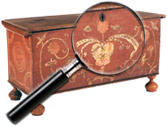|
|
Cartouche – Definition
The decorative arts world has many “squishy” and vague vocabulary words, but few are “squishier” and vaguer than cartouche. Originally, the term comes from Egyptology and is used to describe a oval enclosing hieroglyphics and having a horizontal line at one end. (The line denotes royalty.) The oval had significance not unlike that of a closed circle, in that it was believed that an oval around a person’s name provided protection [...] Click here to continue reading.
Dovetail – A Definition
Examining a piece of furniture is like examining a crime scene – forensics play a role in unraveling puzzles about the who, what, where, when, how of each object. One of the “fingerprints” commonly found in pieces of furniture is the dovetail joint (also known just as dovetail or, in Europe, often called a swallowtail or fantail joint). The photograph here shows the front corner of a drawer in a [...] Click here to continue reading.
Estate of Peter L. Rosenberg of Vallin Galleries, Wilton Connecticut
Discerning collectors, dealers, and museum curators of Asian art regularly made pilgrimages to a charming 18th century saltbox home in Wilton, Connecticut: Vallin Galleries. Owned and operated by Peter L. Rosenberg for nearly thirty years until his sudden death in December of 2013, Vallin Galleries was widely regarded as an outstanding source for the best of Asian art and antiques. Skinner is proud to [...] Click here to continue reading.
Zoar
In the 1810s, a group of German religious separatists left Wurttemberg in what is now southwestern Germany, after several decades of separation from the primary church in the region, the Lutheran Church. After years of persecution and oppression which included imprisonment and property seizures, the separatists, under the leadership of Joseph Bimeler (sometimes Baumeler), decided to flee to the United States in the hopes that they could establish a new community there.
One [...] Click here to continue reading.
Captain Hall J. Tibbits (American, 1797 to 1872)
This article about the life and career of Captain Tibbits by Eric C. Rodenberg appeared on the 4 November 2013 front page of Antique Week’s National Section. Used by permission. http://www.antiqueweek.com.
1800s Sea Captain’s Life Told Through Collection
At 6 foot, 4 inches tall and “powerfully built” Capt. Hall Jackson Tibbits would brook no foolishness.
After his “religious principles” were violated by passengers dancing on [...] Click here to continue reading.
Ormolu
Ormolu, an 18th-century English term, is from the French phrase or moulu, with “or” indicating gold and “moulu” being a form of an old French verb moudre, which means “to grind up.” (This French term for this technique is bronze dore.) This idea of “ground-up gold”refers to the production process of ormolu, where high-quality gold is finely powdered and added to a mercury mixture and applied to a bronze object. Modern usage often [...] Click here to continue reading.
William F. “Buffalo Bill” Cody
The year 1883 neatly divides William Cody’s former life as a hunter, scout and guide from his later career as a showman. He was 37 in this year of transition.
The early life of William Frederick Cody (1846 to 1917) was colorful, adventurous and, thanks to Dime novels, exaggerated. He fought for the Union Army in the Civil War at 18. By 21, he earned his lifelong nickname [...] Click here to continue reading.
Tagua Nuts
Tagua nuts are the endosperm of a genus of South American palm trees that are found from Panama down through Bolivia and Peru. Tagua nuts, or more accurately, the kernels of tagua seeds, are left behind by the wildlife that feed on the palm’s fruit. The group of palms is often referred to as “tagua palms” or “ivory-nut palms,” because tagua nuts are so hard, they resemble elephant ivory. (In fact, the [...] Click here to continue reading.
The Personal Trunk of Jesse Woodson James, American Outlaw
When Jesse James was assassinated by Bob Ford on April 3, 1882 his wife Zerelda notified three of Jesse’s cousins, brothers Joel Rufus & William N. “Babe” Hudspeth and their half brother Joseph Lamartine Hudspeth to come from their home in Lake City, Missouri to St. Joseph to help Zerelda with identification of Jesse’s body and the funeral. They immediately left home in a wagon [...] Click here to continue reading.
Baleen, Plastic of the 18th Century
Baleen comes from a suborder of whales, Mysticeti, which includes, among others, humpback whales, gray whales, right whales and blue whales. What sets these whales apart is baleen. These whales do not have teeth, but have upper jaws filled with two rows of baleen plates fringed with fine baleen hair. These plates are so closely aligned that they act like a comb or a sieve; whales pull water [...] Click here to continue reading.
|
Recent Articles
- Charles Alfred Meurer – American Artist & Tromp L’Oeil Artist
- Sendak, Maurice – American Artist & Writer
- Godie, Lee – American Artist
- Davis, Vestie – American Artist
- Bartlett, Morton – American Artist
- Mackintosh, Dwight – American Artist
- Evans, Minnie Jones – African-American Artist
- Mumma, Ed (Mr. Eddy) – American Artist
- Nice, Don – American Artist
- Savitsky, John (Jack) – American Artist
- Gordon, Harold Theodore (Ted) – American Artist
- Dial, Thornton – African-American Artist
- Doyle Sam – American Artist
- Johnson, Lester Frederick – American Artist
- Finster, Howard – American Artist
|
|
